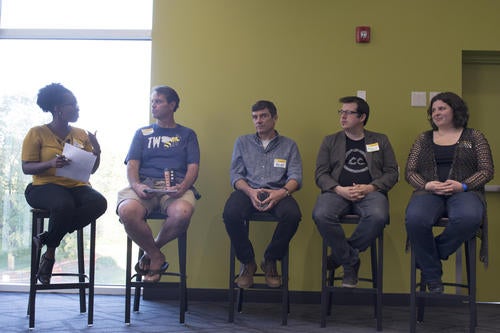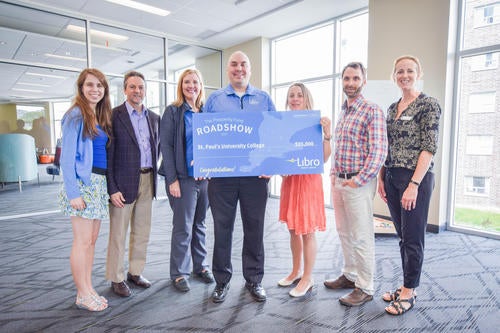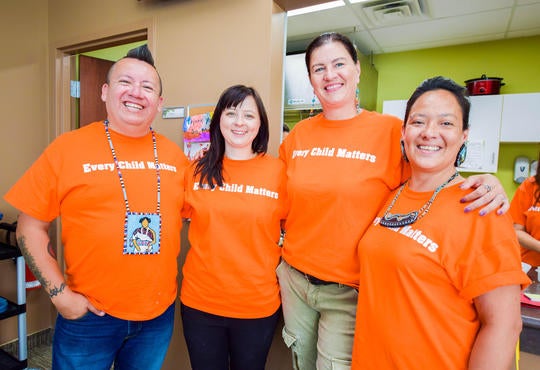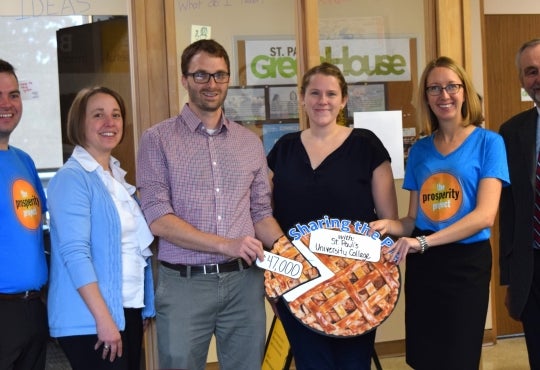GreenHouse receives another boost from Libro Credit Union Prosperity Fund
Libro Credit Union has awarded $35,000 to St. Paul’s GreenHouse from its Prosperity Fund, a program which recognizes initiatives that focus on regional economic development, money smarts, and youth leadership.
The funds will be used to invest in new Discovery Labs and the Big Ideas Challenge to help more students come up with impactful ideas for social good. It is the second time that GreenHouse has received this funding.
"We’re passionate about investing in our communities,” said Martin Kihle, a Libro regional manager for Kitchener-Waterloo. “It’s not just about dollars and cents for us, but about how we conduct business. We salute you for doing good in our communities.”
Tania Del Matto, Director of GreenHouse, said, "The timing couldn’t be better. We’re starting to incorporate Discovery Labs into our brand-new space, which will give support to students in identifying and understanding pressing problems to solve, as well as training and skill development on design thinking practices.”
She added, “These labs will allow for students and community members to co-design early-stage prototypes and provide pathways for these ideas to be incubated in GreenHouse, thereby resulting in more impactful projects and ventures.”
Partners who are scheduled to be part of the Discovery Labs include Waterloo Wellington Local Health Integration Network, KidsAbility, and the Waterloo Global Science Initiative.
This grant will also help the continued growth of the Big Ideas Challenge, a competition that creates Fellowship opportunities for student entrepreneurs to receive in-depth coaching and funding to further develop their ideas and initiatives.
For more information about Libro Credit Union and the Prosperity fund program, visit www.libro.ca/community or follow #prosperhere on social media for pictures, videos and more.
Can a business be co-operative?
University of Waterloo students are more than familiar with the co-op concept when it comes to co-operative education, but much less so when co-op means co-operative enterprise.
And they aren’t alone. Even as there has been a huge upswell of student entrepreneurial activity on university campuses, there has not been a corresponding increase in interest in university students looking to start co-operatives.
Some of this is due to lack of awareness. This fall, GreenHouse decided to change that.
“We wanted to teach our students about co-operatives because while the co-operative business model is not for every business venture, there is a significant overlap between the co-operative model and social purpose business ventures," says GreenHouse Director Tania Del Matto.
The first step was to join forces with Jennifer Ross from the Ontario Co-operative Association to host a Founders Forum featuring local social entrepreneurs who use a co-operative model.

“I wasn’t sure of the co-operative business model or how it works,” says GreenHouse student Greg Szabo, who attended the forum. “I was intrigued by the idea that these companies solve problems on a local level and involve the community in the solution. I don’t think it quite fits with the venture I’m doing but it has definitely made me more aware that there are different ways of doing business.”
It is precisely this different way of doing business that first attracted Albert O’Connor to the co-operative movement. O’Connor, who sat on the Founders Forum panel, is one of the founders of local sustainable products co-operative Avocado.
He says, “Some of our ideas resembled a traditional startup, while others were more like something a foundation or non-profit might pursue. We weren’t sure which way to go. Then we thought about organizations we wanted to model ourselves after, and looked at Mountain Equipment Co-op (MEC). We realized this co-operative model could encompass all of the aspects of the business we wanted to create.”
And MEC is not the only successful co-operative business in Canada. In fact, Canada is home to more than 9,000 co-operatives, with 18 million members and $330 billion in assets. Canadian co-operatives employ more than 150,000 employees, and can be for-profit or not-for-profit organizations.
In essence, says Ross, “Co-operatives are community-focused businesses that balance people, planet and profit. They are formed to seize local opportunities or to respond to local challenges. Co-operatives are owned by the members who use their services or by workers within an organization. The hallmark of the co-operative movement is democracy, with each member holding one vote.”
While some attendees to the forum shared the common perception that the co-operative model is more complicated, O’Connor claims, “It’s actually no more complicated than any corporate structure. The main difference is that shares are owned in a democratic fashion rather than based on how much you’ve paid. But it’s still very possible to be a passive member who simply participates as a consumer or worker, depending on the co-operative structure.”
GreenHouse staff are exploring other ways to see how the co-operative business model might be incorporated at the University, including the idea of integrating teaching into business classes and possibly connecting co-op students with co-operative businesses for their work terms.
“Co-operatives often start when people recognize and seek to address a need or issue. The fact that social entrepreneurs are already addressing major issues, care about a triple bottom line, and often have people interested in participating in their venture, suggests that the co-operative model may be a good fit for many social entrepreneurs,” says Ross.










